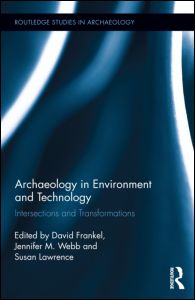Archaeology in Environment and Technology
 Intersections and Transformations
Intersections and Transformations
Edited by David Frankel, Susan Lawrence, Jennifer Webb
Published 22nd March 2013 by Routledge – 250 pages
Description:
Environments, landscapes, and ecological systems are often seen as fundamental by archaeologists, but how they relate to society is understood in very different ways. The chapters in this book take environment, culture, and technology together. All have been the focus of much attention; often one or other has been seen as the starting point for analysis, but this volume argues that it is the study of the inter-relationships between these three factors that offers a way forward. The contributions to this book pick up different strands within the tangled web of intersections between environment, technology, and society, providing a series of case studies which explore facets of this common theme in different settings and circumstances and from different perspectives. As well as addressing themes of theoretical and methodological interest, these case studies draw on primary research dealing with time periods from the late Pleistocene glacial maximum to the very recent past, and involve societies of very different types. Running through all the contributions, however, is a concern with the archaeological record and the ways in which scales of observation and availability of evidence affect the development of questions and explanations.
The diversity of the chapters in this volume demonstrates the inherent weakness in any attempt to prioritise environment, technology, or society. These three factors are all embedded in any human activity, as change in one will result in change in the others: social and technical changes alter relations with the environment–and indeed the environment itself—and as environmental change drives changes in society and technology. As this book shows, it is possible to consider the relationship between the three factors from different perspectives, but any attempt to consider one or even two in isolation will mean that valuable insights will be missed.
Contents:
1. Complex Relations: Intersections in Time and Space David Frankel, Jennifer Webb, and Susan Lawrence
Part 1: Responses to Environments
2. Perspectives on Global Comparative Hunter-Gatherer Archaeology: Glacial Southwest Tasmania and Southwest France Richard Cosgrove, Jean-Michel Geneste, Jean-Pierre Chadelle, and Jean-Christophe Castel 3. Strategies for Investigating Human Responses to Changes in Landscape and Climate at Lake Mungo in the Willandra Lakes, Southeast Australia Nicola Stern, Jacqueline Tumney, Kathryn E. Fitzsimmons, and Paul Kajewski 4. A New Ecological Framework for Understanding Human–Environment Interactions in Arid Australia Simon J. Holdaway, Matthew Douglass, and Patricia C. Fanning
5. Integrating Hunter–Gatherer Sites, Environments, Technology, and Art in Western Victoria David Frankel & Caroline Bird
6. Pushing the Boundaries: Imperial Responses to Environmental Constraints in Early Islamic Afghanistan David C. Thomas
2. Perspectives on Global Comparative Hunter-Gatherer Archaeology: Glacial Southwest Tasmania and Southwest France Richard Cosgrove, Jean-Michel Geneste, Jean-Pierre Chadelle, and Jean-Christophe Castel 3. Strategies for Investigating Human Responses to Changes in Landscape and Climate at Lake Mungo in the Willandra Lakes, Southeast Australia Nicola Stern, Jacqueline Tumney, Kathryn E. Fitzsimmons, and Paul Kajewski 4. A New Ecological Framework for Understanding Human–Environment Interactions in Arid Australia Simon J. Holdaway, Matthew Douglass, and Patricia C. Fanning
5. Integrating Hunter–Gatherer Sites, Environments, Technology, and Art in Western Victoria David Frankel & Caroline Bird
6. Pushing the Boundaries: Imperial Responses to Environmental Constraints in Early Islamic Afghanistan David C. Thomas
Part 2: Technology and the Environment 7. A Long-Term History of Horticultural Innovation and Introduction in the Highlands of Papua New Guinea Tim Denham
8. Agricultural Economies and Pyrotechnologies in Bronze Age Jordan and Cyprus Steven E. Falconer & Patricia L. Fall
9. Changing Technological and Social Environments in the Second Half of the Third Millennium BC in CyprusJennifer M. Webb
10. Landscape Learning in Colonial Australia: Technologies of Water Management on the Central Highlands Goldfields of Victoria Susan Lawrence & Peter Davies
8. Agricultural Economies and Pyrotechnologies in Bronze Age Jordan and Cyprus Steven E. Falconer & Patricia L. Fall
9. Changing Technological and Social Environments in the Second Half of the Third Millennium BC in CyprusJennifer M. Webb
10. Landscape Learning in Colonial Australia: Technologies of Water Management on the Central Highlands Goldfields of Victoria Susan Lawrence & Peter Davies
Part 3: Nature and Culture 11. Exploring Human-Plant Entanglements: The Case of AustralianDioscorea Yams Jennifer Atchison and Lesley Head
12. People and their Environments: Do Cultural and Natural Values Intersect in the Cultural Landscapes on the World Heritage List? Anita Smith
12. People and their Environments: Do Cultural and Natural Values Intersect in the Cultural Landscapes on the World Heritage List? Anita Smith
For more information: http://www.routledge.com/books/details/9780415832014/








0 Comment :
Post a Comment
Thanks for your comment!